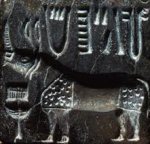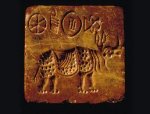Hey, and then there is............
Psalms 29:6) He maketh them also to skip like a calf; Lebanon and Sirion like a young unicorn.
Psalms 92:10) But my horn shalt thou exalt like the horn of an unicorn: I shall be anointed with fresh oil.
Deuteronomy 33:17 “His glory is like the firstling of his bullock, and his horns are like the horns of unicorns: with them he shall push the people together to the ends of the earth: and they are the ten thousands of Ephraim, and they are the thousands of Manasseh.”
Psalms 22:21 “Save me from the lion’s mouth: for thou hast heard me from the horns of the unicorns.”
Isaiah 34:7 “And the unicorns shall come down with them, and the bullocks with the bulls; and their land shall be soaked with blood, and their dust made fat with fatness.”
Numbers 23:22 “God brought them out of Egypt; he hath as it were the strength of an unicorn.”
Numbers 24:8 “God brought him forth out of Egypt; he hath as it were the strength of an unicorn: he shall eat up the nations his enemies, and shall break their bones, and pierce them through with his arrows.”
Article found here:
Why Does The Bible Mention Unicorns? | Creation Today
Unicorns are not mentioned in any of the modern translations. Only in the King James version are they mentioned. Most of the modern translations say “wild ox.” Some translations even say “buffalo.”
However, many Christian apologists are insistent that the King James Version is the most accurate of all the English translations. So because of this, some people, especially atheists, like to scoff at the Bible and make fun of it as a book of myths and fairy tales.
However, it is important to understand that the definition of the word “unicorn” has changed over time.
If you get an old 1828
Noah Webster’s Dictionary, which is the very first edition dictionary that Webster came out with about 200 years ago, and look up the word “unicorn” it says:
Unicorn – An animal with one horn; the monoceros. this name is often applied to the rhinoceros.
(This 1828 dictionary can be accessed free online. Just go to Google.com and type in “Noah Webster 1828” and it will be one of the first links that pop up.)
Notice how this 200-year-old definition of the word “unicorn” says absolutely nothing about a horse. It says nothing about a horse-like animal, or a mythical animal, or a fictitious creature. It says absolutely nothing about mythology whatsoever. But rather, it says that this is a name that is often applied to the rhinoceros.
Now, anyone who has ever seen a rhinoceros knows that a rhino has two horns — a larger one up front, and a smaller one behind. So, how could a rhinoceros be considered a unicorn?
Well, if you look up the word “rhinoceros” in the same dictionary it says:
Rhinoceros – A genus of quadrupeds of two species, one of which, the
unicorn, has a single horn growing almost erect from the nose. This animal when full grown, is said to be 12 feet in length. There is another species with two horns, the
bicornis. They are natives of Asia and Africa.
According to Noah Webster, back in the early 1800’s it was understood that there were two species of the rhinoceros. The one-horned species was called “unicorn,” and the two-horned species was called “bicornis.”
Today it is understood that there are five species of the rhinoceros, three of which have two horns, and two of which have one horn.
So basically, if you get a 200-year-old Noah Webster’s dictionary and look up the word “unicorn” it says “rhinoceros,” and if you look up the word “rhinoceros” it says “unicorn.” That was just 200 years ago. The King James was translated 400 years ago in 1611. One does not have to be good at math to figure this out.
Today’s definition of the word “unicorn” says absolutely nothing about a rhinoceros, and today’s definition of “rhinoceros” says absolutely nothing about a unicorn. The definitions have changed over time.
So, if the definition of “unicorn” has changed in just the past 200 years from rhinoceros to horse, then it doesn’t make much sense to take a modern definition of the word “unicorn” and apply it to a 400-year-old translation of the Bible. That’s illogical.
As a matter of fact, even today the scientific name of the Asian One-Horned Rhinoceros is
Rhinoceros unicornis. And
Diceros bicornis is the scientific name of a two-horned rhinoceros called the Black Rhinoceros. Where do you think those scientific names came from?
Well, they came from the Latin. Unicornis and bicornis are Latin words. That’s interesting, because If you look up Psalm 92:10 in the Latin Bible, the Latin word that is being used here is the word “unicornis.”
Psalm 92:10 in the Latin text:
“Et exaltabitur sicut
unicornis cornu meum,
et senectus mea in misericordia uberi.”
“Unicornis” is the same Latin word that is being used in the scientific name of the Asian One-Horned Rhinoceros.
If you look up Job 39:9 in the Latin Bible, the word that is being used here is the word “rinoceros”:
Job 39:9 in the Latin text:
numquid volet
rinoceros servire tibi,
aut morabitur ad praesepe tuum
So, one verse says “rinoceros” and the other says “unicornis.”










